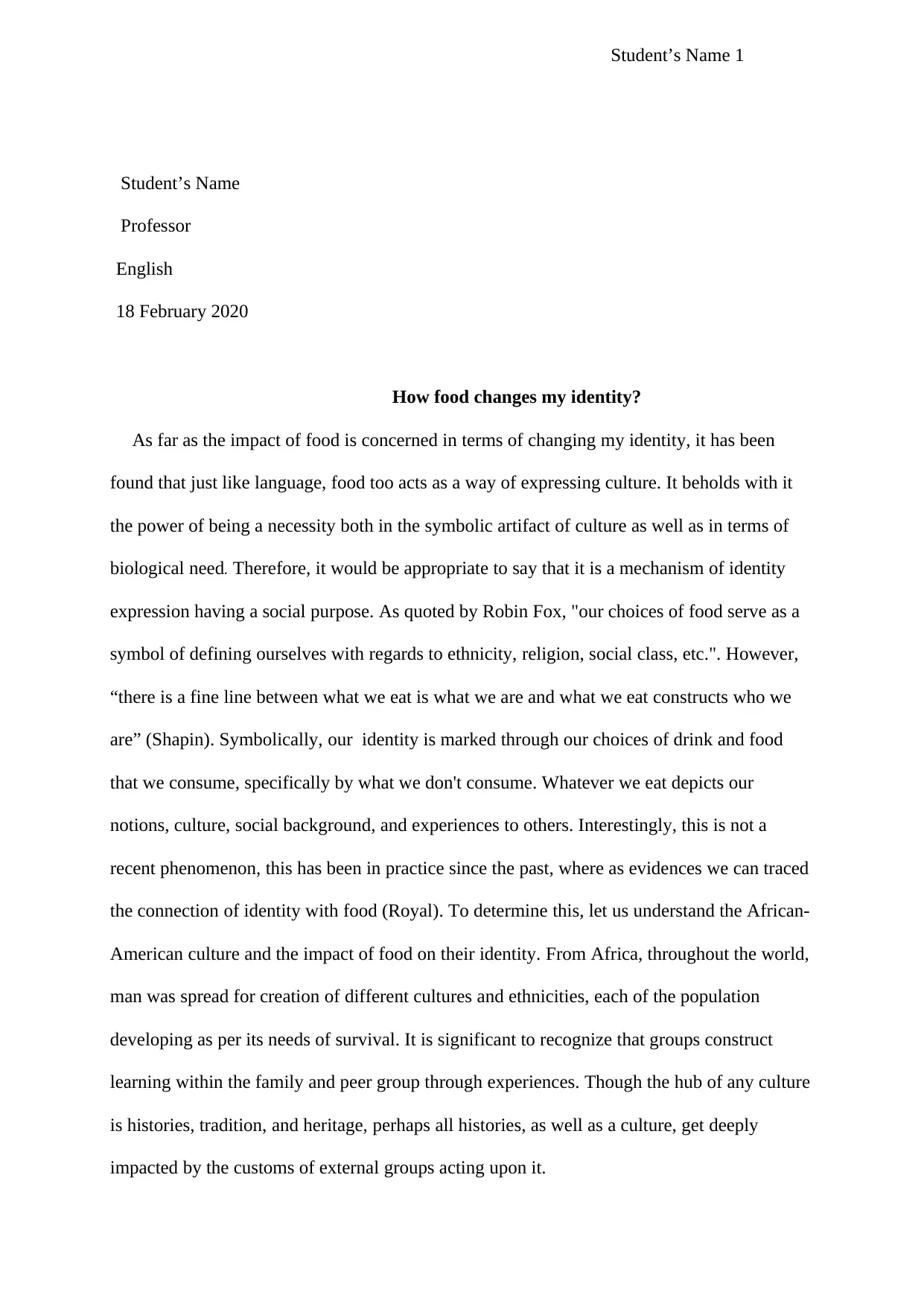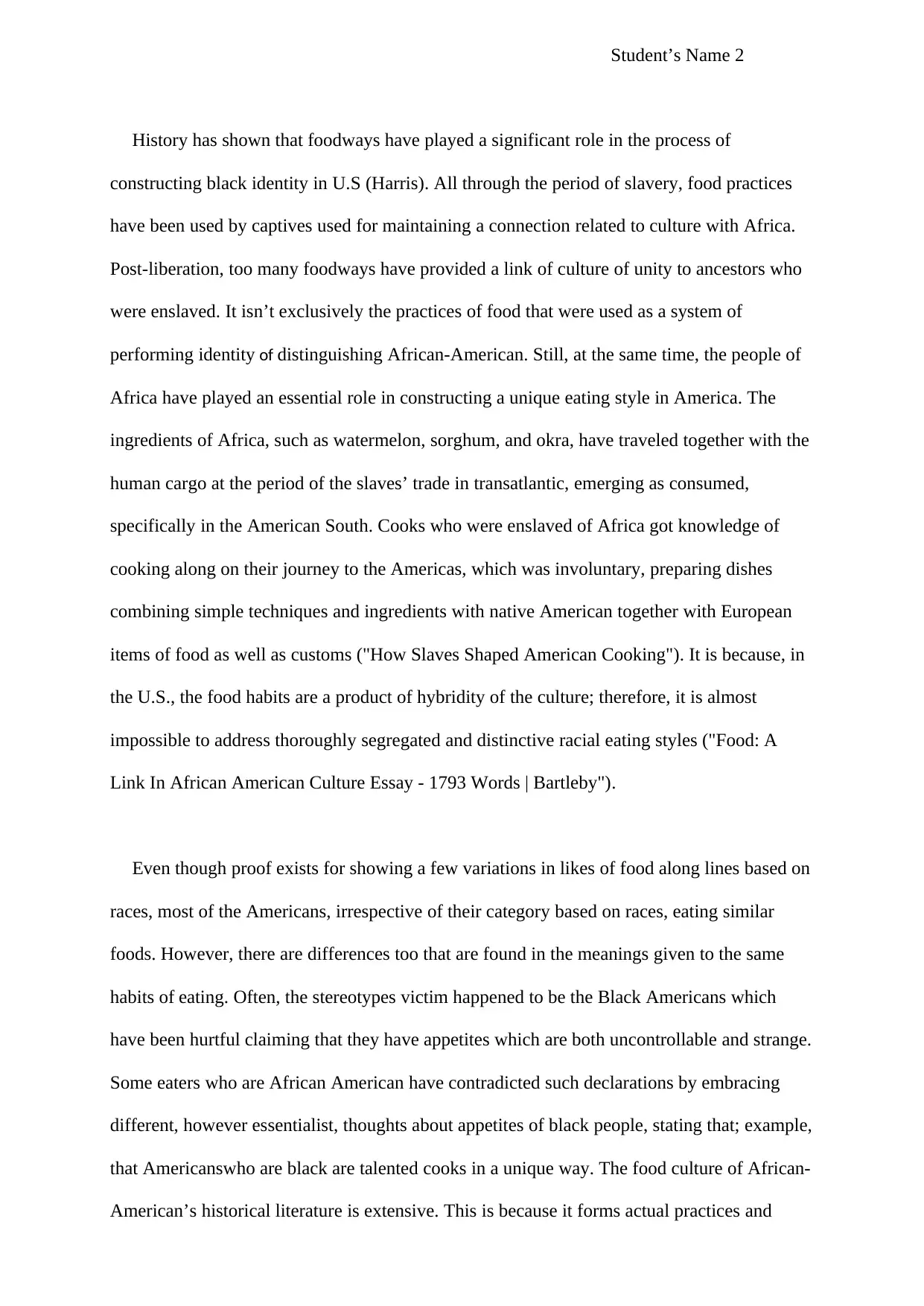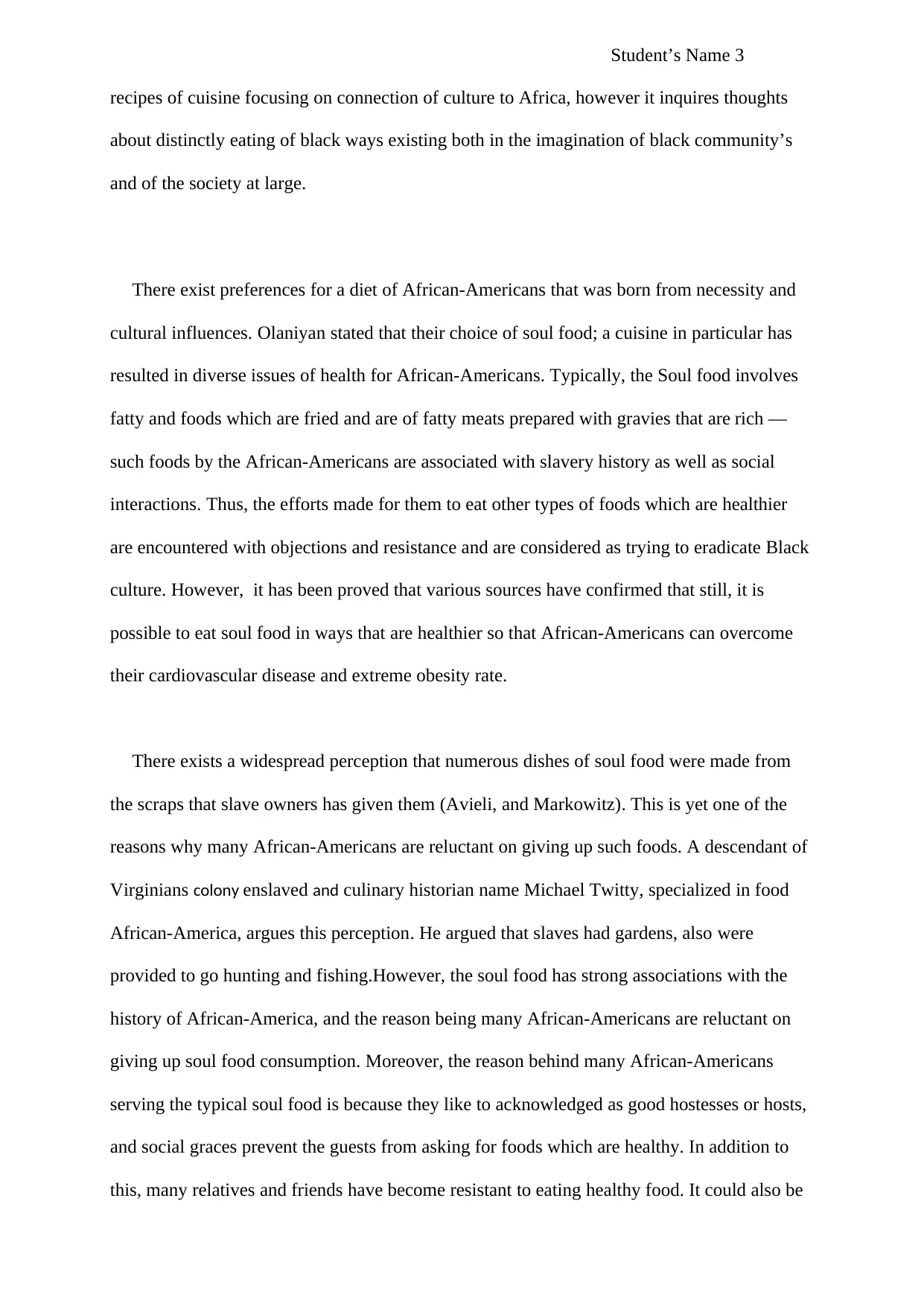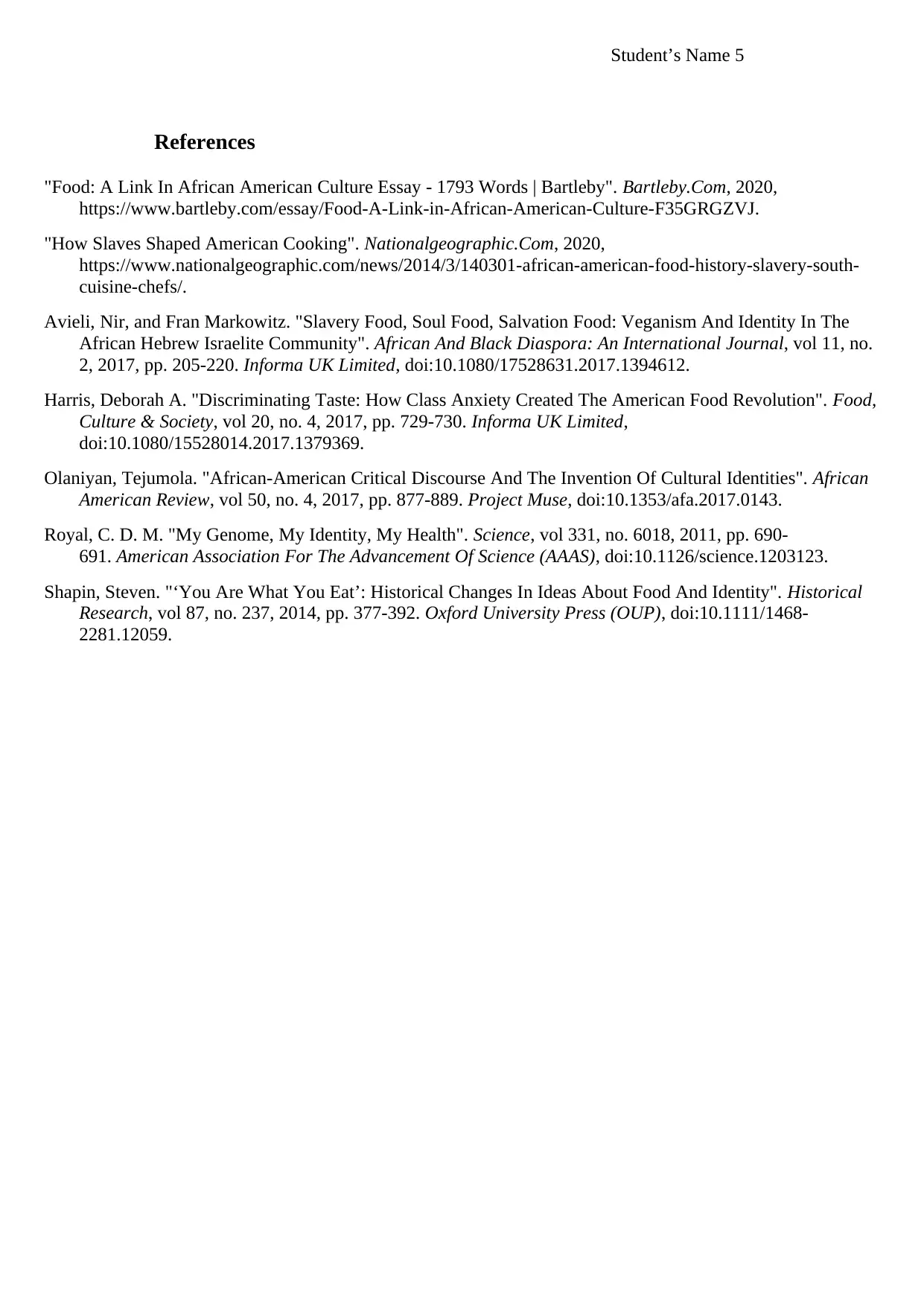Food as a Cultural Identity Marker: An Essay for English Composition
VerifiedAdded on 2022/08/08
|5
|1471
|26
Essay
AI Summary
This essay explores the significant impact of food on shaping identity, drawing parallels between food and language as expressions of culture. It delves into how food choices symbolize ethnicity, religion, and social class, highlighting the historical connection between foodways and the construction of black identity in the U.S. The essay discusses how enslaved Africans maintained cultural ties through food practices and contributed to a unique American eating style by blending African ingredients with Native American and European culinary traditions. It also addresses stereotypes surrounding African-American food habits and the complexities of embracing soul food, considering its historical roots and health implications. The essay concludes by emphasizing the enduring connection between food and identity, underscoring its relevance in both historical and contemporary contexts.

Student’s Name 1
Student’s Name
Professor
English
18 February 2020
How food changes my identity?
As far as the impact of food is concerned in terms of changing my identity, it has been
found that just like language, food too acts as a way of expressing culture. It beholds with it
the power of being a necessity both in the symbolic artifact of culture as well as in terms of
biological need. Therefore, it would be appropriate to say that it is a mechanism of identity
expression having a social purpose. As quoted by Robin Fox, "our choices of food serve as a
symbol of defining ourselves with regards to ethnicity, religion, social class, etc.". However,
“there is a fine line between what we eat is what we are and what we eat constructs who we
are” (Shapin). Symbolically, our identity is marked through our choices of drink and food
that we consume, specifically by what we don't consume. Whatever we eat depicts our
notions, culture, social background, and experiences to others. Interestingly, this is not a
recent phenomenon, this has been in practice since the past, where as evidences we can traced
the connection of identity with food (Royal). To determine this, let us understand the African-
American culture and the impact of food on their identity. From Africa, throughout the world,
man was spread for creation of different cultures and ethnicities, each of the population
developing as per its needs of survival. It is significant to recognize that groups construct
learning within the family and peer group through experiences. Though the hub of any culture
is histories, tradition, and heritage, perhaps all histories, as well as a culture, get deeply
impacted by the customs of external groups acting upon it.
Student’s Name
Professor
English
18 February 2020
How food changes my identity?
As far as the impact of food is concerned in terms of changing my identity, it has been
found that just like language, food too acts as a way of expressing culture. It beholds with it
the power of being a necessity both in the symbolic artifact of culture as well as in terms of
biological need. Therefore, it would be appropriate to say that it is a mechanism of identity
expression having a social purpose. As quoted by Robin Fox, "our choices of food serve as a
symbol of defining ourselves with regards to ethnicity, religion, social class, etc.". However,
“there is a fine line between what we eat is what we are and what we eat constructs who we
are” (Shapin). Symbolically, our identity is marked through our choices of drink and food
that we consume, specifically by what we don't consume. Whatever we eat depicts our
notions, culture, social background, and experiences to others. Interestingly, this is not a
recent phenomenon, this has been in practice since the past, where as evidences we can traced
the connection of identity with food (Royal). To determine this, let us understand the African-
American culture and the impact of food on their identity. From Africa, throughout the world,
man was spread for creation of different cultures and ethnicities, each of the population
developing as per its needs of survival. It is significant to recognize that groups construct
learning within the family and peer group through experiences. Though the hub of any culture
is histories, tradition, and heritage, perhaps all histories, as well as a culture, get deeply
impacted by the customs of external groups acting upon it.
Paraphrase This Document
Need a fresh take? Get an instant paraphrase of this document with our AI Paraphraser

Student’s Name 2
History has shown that foodways have played a significant role in the process of
constructing black identity in U.S (Harris). All through the period of slavery, food practices
have been used by captives used for maintaining a connection related to culture with Africa.
Post-liberation, too many foodways have provided a link of culture of unity to ancestors who
were enslaved. It isn’t exclusively the practices of food that were used as a system of
performing identity of distinguishing African-American. Still, at the same time, the people of
Africa have played an essential role in constructing a unique eating style in America. The
ingredients of Africa, such as watermelon, sorghum, and okra, have traveled together with the
human cargo at the period of the slaves’ trade in transatlantic, emerging as consumed,
specifically in the American South. Cooks who were enslaved of Africa got knowledge of
cooking along on their journey to the Americas, which was involuntary, preparing dishes
combining simple techniques and ingredients with native American together with European
items of food as well as customs ("How Slaves Shaped American Cooking"). It is because, in
the U.S., the food habits are a product of hybridity of the culture; therefore, it is almost
impossible to address thoroughly segregated and distinctive racial eating styles ("Food: A
Link In African American Culture Essay - 1793 Words | Bartleby").
Even though proof exists for showing a few variations in likes of food along lines based on
races, most of the Americans, irrespective of their category based on races, eating similar
foods. However, there are differences too that are found in the meanings given to the same
habits of eating. Often, the stereotypes victim happened to be the Black Americans which
have been hurtful claiming that they have appetites which are both uncontrollable and strange.
Some eaters who are African American have contradicted such declarations by embracing
different, however essentialist, thoughts about appetites of black people, stating that; example,
that Americanswho are black are talented cooks in a unique way. The food culture of African-
American’s historical literature is extensive. This is because it forms actual practices and
History has shown that foodways have played a significant role in the process of
constructing black identity in U.S (Harris). All through the period of slavery, food practices
have been used by captives used for maintaining a connection related to culture with Africa.
Post-liberation, too many foodways have provided a link of culture of unity to ancestors who
were enslaved. It isn’t exclusively the practices of food that were used as a system of
performing identity of distinguishing African-American. Still, at the same time, the people of
Africa have played an essential role in constructing a unique eating style in America. The
ingredients of Africa, such as watermelon, sorghum, and okra, have traveled together with the
human cargo at the period of the slaves’ trade in transatlantic, emerging as consumed,
specifically in the American South. Cooks who were enslaved of Africa got knowledge of
cooking along on their journey to the Americas, which was involuntary, preparing dishes
combining simple techniques and ingredients with native American together with European
items of food as well as customs ("How Slaves Shaped American Cooking"). It is because, in
the U.S., the food habits are a product of hybridity of the culture; therefore, it is almost
impossible to address thoroughly segregated and distinctive racial eating styles ("Food: A
Link In African American Culture Essay - 1793 Words | Bartleby").
Even though proof exists for showing a few variations in likes of food along lines based on
races, most of the Americans, irrespective of their category based on races, eating similar
foods. However, there are differences too that are found in the meanings given to the same
habits of eating. Often, the stereotypes victim happened to be the Black Americans which
have been hurtful claiming that they have appetites which are both uncontrollable and strange.
Some eaters who are African American have contradicted such declarations by embracing
different, however essentialist, thoughts about appetites of black people, stating that; example,
that Americanswho are black are talented cooks in a unique way. The food culture of African-
American’s historical literature is extensive. This is because it forms actual practices and

Student’s Name 3
recipes of cuisine focusing on connection of culture to Africa, however it inquires thoughts
about distinctly eating of black ways existing both in the imagination of black community’s
and of the society at large.
There exist preferences for a diet of African-Americans that was born from necessity and
cultural influences. Olaniyan stated that their choice of soul food; a cuisine in particular has
resulted in diverse issues of health for African-Americans. Typically, the Soul food involves
fatty and foods which are fried and are of fatty meats prepared with gravies that are rich —
such foods by the African-Americans are associated with slavery history as well as social
interactions. Thus, the efforts made for them to eat other types of foods which are healthier
are encountered with objections and resistance and are considered as trying to eradicate Black
culture. However, it has been proved that various sources have confirmed that still, it is
possible to eat soul food in ways that are healthier so that African-Americans can overcome
their cardiovascular disease and extreme obesity rate.
There exists a widespread perception that numerous dishes of soul food were made from
the scraps that slave owners has given them (Avieli, and Markowitz). This is yet one of the
reasons why many African-Americans are reluctant on giving up such foods. A descendant of
Virginians colony enslaved and culinary historian name Michael Twitty, specialized in food
African-America, argues this perception. He argued that slaves had gardens, also were
provided to go hunting and fishing.However, the soul food has strong associations with the
history of African-America, and the reason being many African-Americans are reluctant on
giving up soul food consumption. Moreover, the reason behind many African-Americans
serving the typical soul food is because they like to acknowledged as good hostesses or hosts,
and social graces prevent the guests from asking for foods which are healthy. In addition to
this, many relatives and friends have become resistant to eating healthy food. It could also be
recipes of cuisine focusing on connection of culture to Africa, however it inquires thoughts
about distinctly eating of black ways existing both in the imagination of black community’s
and of the society at large.
There exist preferences for a diet of African-Americans that was born from necessity and
cultural influences. Olaniyan stated that their choice of soul food; a cuisine in particular has
resulted in diverse issues of health for African-Americans. Typically, the Soul food involves
fatty and foods which are fried and are of fatty meats prepared with gravies that are rich —
such foods by the African-Americans are associated with slavery history as well as social
interactions. Thus, the efforts made for them to eat other types of foods which are healthier
are encountered with objections and resistance and are considered as trying to eradicate Black
culture. However, it has been proved that various sources have confirmed that still, it is
possible to eat soul food in ways that are healthier so that African-Americans can overcome
their cardiovascular disease and extreme obesity rate.
There exists a widespread perception that numerous dishes of soul food were made from
the scraps that slave owners has given them (Avieli, and Markowitz). This is yet one of the
reasons why many African-Americans are reluctant on giving up such foods. A descendant of
Virginians colony enslaved and culinary historian name Michael Twitty, specialized in food
African-America, argues this perception. He argued that slaves had gardens, also were
provided to go hunting and fishing.However, the soul food has strong associations with the
history of African-America, and the reason being many African-Americans are reluctant on
giving up soul food consumption. Moreover, the reason behind many African-Americans
serving the typical soul food is because they like to acknowledged as good hostesses or hosts,
and social graces prevent the guests from asking for foods which are healthy. In addition to
this, many relatives and friends have become resistant to eating healthy food. It could also be
⊘ This is a preview!⊘
Do you want full access?
Subscribe today to unlock all pages.

Trusted by 1+ million students worldwide

Student’s Name 4
because they have a sense that it will not be delicious.Last but not least, it can be witnessed
how impactful food is in shaping the identity of people irrespective of the time frame. This
means that even though we live in modern society, this should be assured that the connection
between food and identity of an individual is not something very recent or has come into
practice lately. Instead it has been practiced and followed from a long time back.
because they have a sense that it will not be delicious.Last but not least, it can be witnessed
how impactful food is in shaping the identity of people irrespective of the time frame. This
means that even though we live in modern society, this should be assured that the connection
between food and identity of an individual is not something very recent or has come into
practice lately. Instead it has been practiced and followed from a long time back.
Paraphrase This Document
Need a fresh take? Get an instant paraphrase of this document with our AI Paraphraser

Student’s Name 5
References
"Food: A Link In African American Culture Essay - 1793 Words | Bartleby". Bartleby.Com, 2020,
https://www.bartleby.com/essay/Food-A-Link-in-African-American-Culture-F35GRGZVJ.
"How Slaves Shaped American Cooking". Nationalgeographic.Com, 2020,
https://www.nationalgeographic.com/news/2014/3/140301-african-american-food-history-slavery-south-
cuisine-chefs/.
Avieli, Nir, and Fran Markowitz. "Slavery Food, Soul Food, Salvation Food: Veganism And Identity In The
African Hebrew Israelite Community". African And Black Diaspora: An International Journal, vol 11, no.
2, 2017, pp. 205-220. Informa UK Limited, doi:10.1080/17528631.2017.1394612.
Harris, Deborah A. "Discriminating Taste: How Class Anxiety Created The American Food Revolution". Food,
Culture & Society, vol 20, no. 4, 2017, pp. 729-730. Informa UK Limited,
doi:10.1080/15528014.2017.1379369.
Olaniyan, Tejumola. "African-American Critical Discourse And The Invention Of Cultural Identities". African
American Review, vol 50, no. 4, 2017, pp. 877-889. Project Muse, doi:10.1353/afa.2017.0143.
Royal, C. D. M. "My Genome, My Identity, My Health". Science, vol 331, no. 6018, 2011, pp. 690-
691. American Association For The Advancement Of Science (AAAS), doi:10.1126/science.1203123.
Shapin, Steven. "‘You Are What You Eat’: Historical Changes In Ideas About Food And Identity". Historical
Research, vol 87, no. 237, 2014, pp. 377-392. Oxford University Press (OUP), doi:10.1111/1468-
2281.12059.
References
"Food: A Link In African American Culture Essay - 1793 Words | Bartleby". Bartleby.Com, 2020,
https://www.bartleby.com/essay/Food-A-Link-in-African-American-Culture-F35GRGZVJ.
"How Slaves Shaped American Cooking". Nationalgeographic.Com, 2020,
https://www.nationalgeographic.com/news/2014/3/140301-african-american-food-history-slavery-south-
cuisine-chefs/.
Avieli, Nir, and Fran Markowitz. "Slavery Food, Soul Food, Salvation Food: Veganism And Identity In The
African Hebrew Israelite Community". African And Black Diaspora: An International Journal, vol 11, no.
2, 2017, pp. 205-220. Informa UK Limited, doi:10.1080/17528631.2017.1394612.
Harris, Deborah A. "Discriminating Taste: How Class Anxiety Created The American Food Revolution". Food,
Culture & Society, vol 20, no. 4, 2017, pp. 729-730. Informa UK Limited,
doi:10.1080/15528014.2017.1379369.
Olaniyan, Tejumola. "African-American Critical Discourse And The Invention Of Cultural Identities". African
American Review, vol 50, no. 4, 2017, pp. 877-889. Project Muse, doi:10.1353/afa.2017.0143.
Royal, C. D. M. "My Genome, My Identity, My Health". Science, vol 331, no. 6018, 2011, pp. 690-
691. American Association For The Advancement Of Science (AAAS), doi:10.1126/science.1203123.
Shapin, Steven. "‘You Are What You Eat’: Historical Changes In Ideas About Food And Identity". Historical
Research, vol 87, no. 237, 2014, pp. 377-392. Oxford University Press (OUP), doi:10.1111/1468-
2281.12059.
1 out of 5
Related Documents
Your All-in-One AI-Powered Toolkit for Academic Success.
+13062052269
info@desklib.com
Available 24*7 on WhatsApp / Email
![[object Object]](/_next/static/media/star-bottom.7253800d.svg)
Unlock your academic potential
Copyright © 2020–2025 A2Z Services. All Rights Reserved. Developed and managed by ZUCOL.





